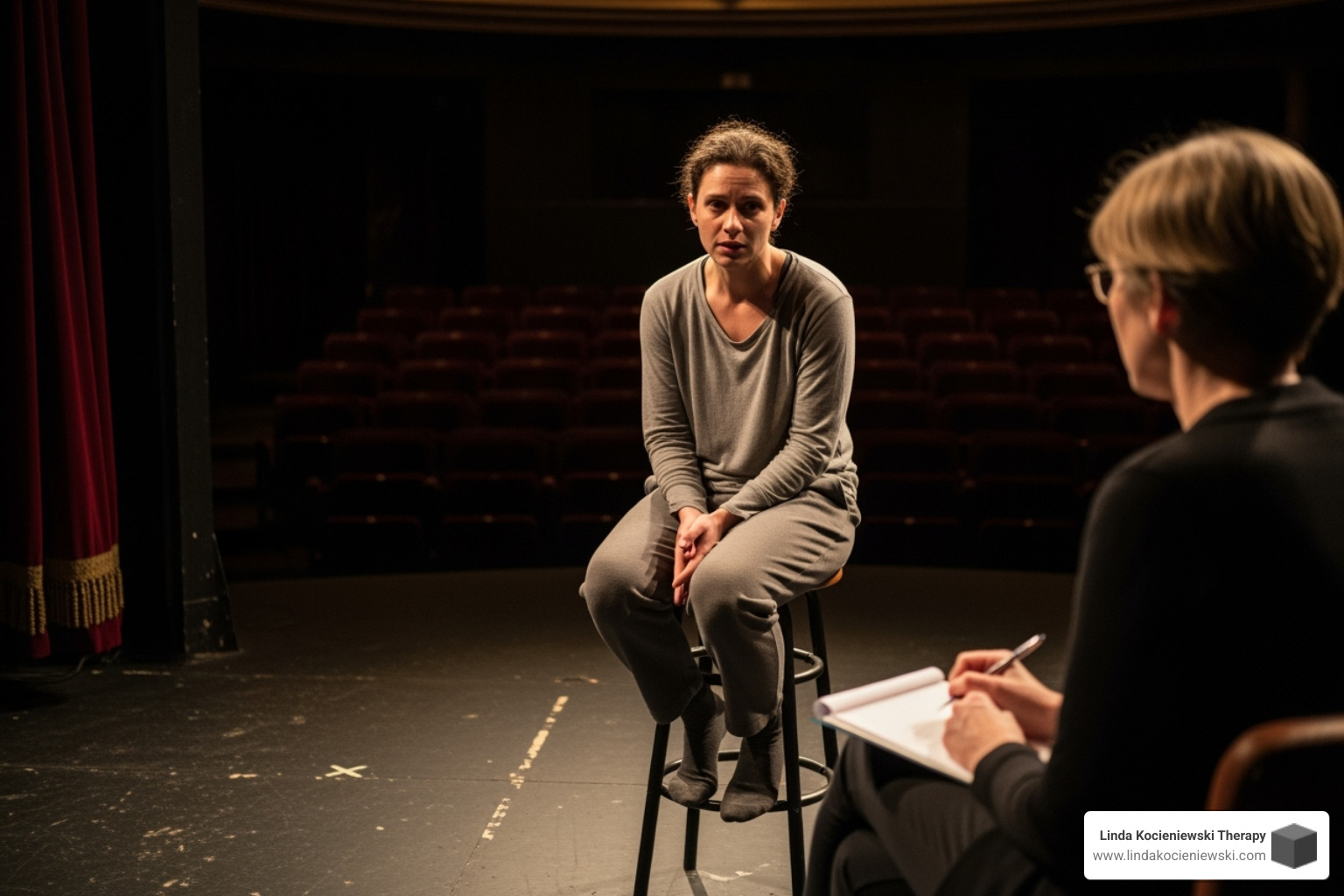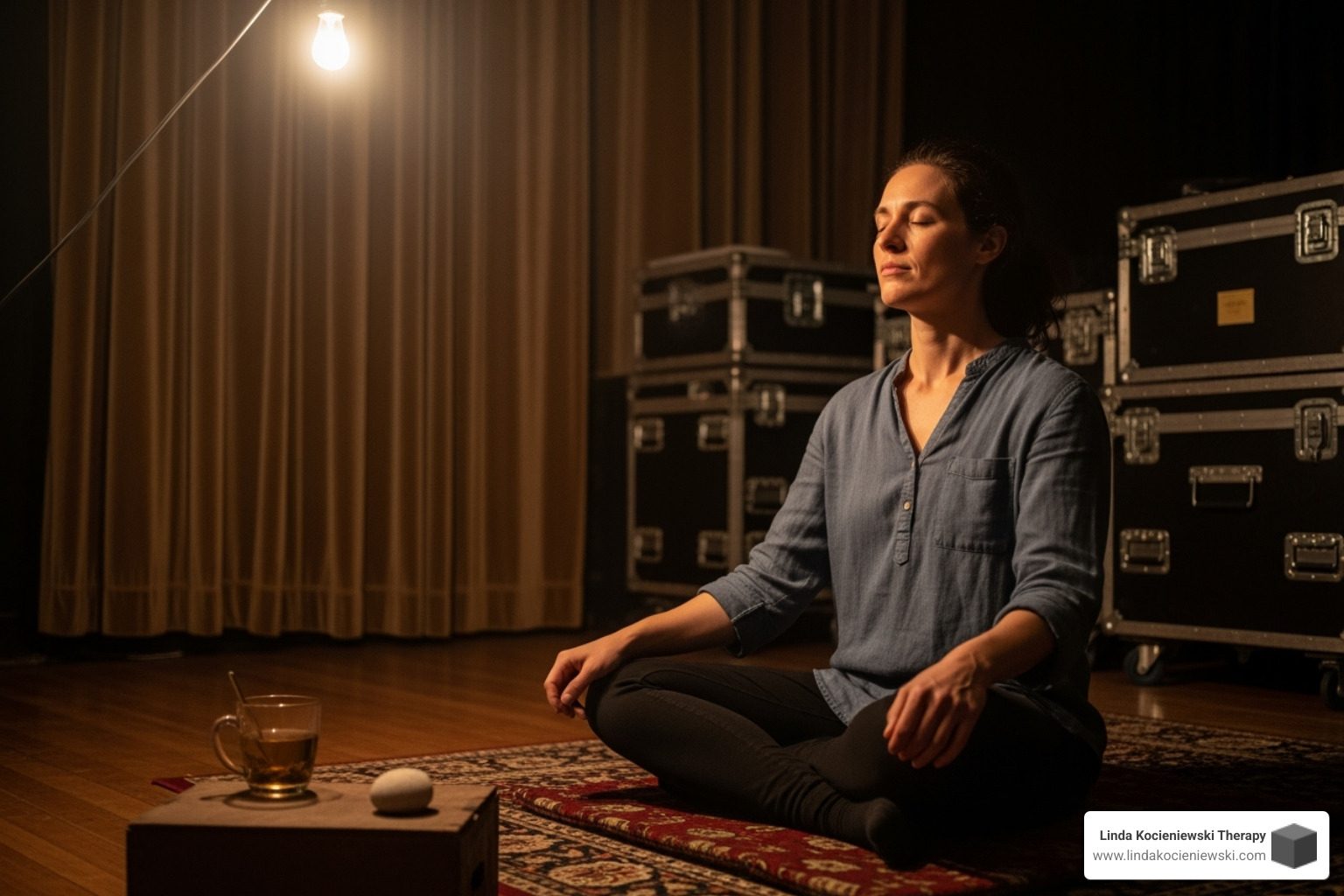Unleash Your Inner Star: Why Performers Need Specialized Therapy
Why Performers Face Unique Mental Health Challenges

The spotlight is both a gift and a burden. While performers bring joy to countless lives, they also face extraordinary psychological pressures. The constant cycle of auditions, rejection, financial uncertainty, and public scrutiny creates a perfect storm for mental health challenges. Research shows that performers are 10 times more likely to suffer from anxiety and five times more prone to depression than the general population.
Specialized therapy for performers addresses these unique needs, helping with performance anxiety, identity work, trauma processing, and creative blocks. It builds resilience for an unpredictable career, challenging the harmful myth of the "tortured artist." The truth is that healing doesn't diminish creativity—it improves it by removing the emotional blocks that prevent artists from accessing their full potential.
I'm Linda Kocieniewski, a Licensed Clinical Social Worker and Certified EMDR Therapist. I specialize in helping adults overcome trauma and achieve peak performance. Through my work providing therapy for performers in Manhattan and throughout New York State, I've seen how specialized treatment can transform careers and lives by addressing the unique challenges of creative professions.
The Performer's Paradox: Unique Mental Health Challenges Behind the Curtain
The life of a performer is a high-stakes balance of vulnerability and resilience. Artists contend with intense public scrutiny, where every performance and even their personal lives are subject to harsh judgment. This pressure to always be "on" blurs the lines between the authentic self and the public persona, creating a significant emotional toll. The constant cycle of auditions and rejection tests self-worth, while financial insecurity adds immense stress. Many also struggle with imposter syndrome and perfectionism, leading to burnout and self-criticism.
The Weight of Expectation

The job often requires projecting an image that doesn't align with how you truly feel. As Michael Jordan noted about fame, "The hard part is every day you have to be in a good mood, because that is what people expect." This emotional labor leads to chronic stress as every interaction feels like an evaluation. Seeking constant external validation can erode self-esteem, making it hard to separate professional output from personal identity. Therapy for performers provides a safe space to explore these dynamics and develop healthier ways to cope with criticism.
Music creators are 50% more likely to feel depressed and more than twice as likely to feel powerless. Many performers also experience post-performance depression, an emotional void after a show or tour ends, leaving them feeling lost and without purpose. These realities underscore why specialized therapy is not just beneficial, but essential.
Losing Yourself in the Role: Identity, Burnout, and Creative Blocks
The art of performance requires stepping outside of yourself to become someone else. While this creates magic on screen and stage, it can also blur the lines between who you are and what you do. This identity fusion with roles is a complex challenge, as is the emotional labor of performing—constantly suppressing personal feelings to serve the art. This compartmentalization can lead to a disconnection from your authentic self.
The industry's feast-or-famine cycle of intense work followed by dry spells can lead to burnout, while the emotional highs of performing can be followed by devastating post-performance drops. When these pressures accumulate, they often manifest as creative blocks, which can feel like a threat to your identity and livelihood.
Separating the Performer from the Person

The question "Who am I when I'm not performing?" is a difficult one for many artists. Therapy for performers provides a space to explore your personal identity separate from professional achievements. For example, after his intense role in "Black Panther," actor Michael B. Jordan sought therapy to help separate himself from the character's dark emotional weight. His experience shows that seeking help is a sign of professional wisdom. Therapy helps you define your values and aspirations independent of your craft, ensuring your art serves your life, not consumes it. You can learn more in our guide to psychotherapy for stress.
Overcoming Creative Problems
Performance anxiety, stage fright, and fear of failure are not character flaws; they are often symptoms of deeper, unresolved emotional conflicts. A past harsh critique or moment of embarrassment can manifest as creative stagnation today. Therapy helps identify and address the root causes of these obstacles. By resolving the underlying issues, you can remove the emotional constraints holding you back and open up new levels of artistic expression, creating from a place of clarity and authenticity rather than fear.
A New Script: How Specialized Therapy for Performers Can Help
Specialized therapy for performers offers a confidential space where the curtain can fall and you don't have to perform. It's a private rehearsal room for your emotional life, where you can process industry-specific trauma—from rejection to harsh criticism—without fear of professional consequences. The goal is to help you thrive by building resilience, developing healthy coping mechanisms, and improving self-worth that isn't dependent on external validation.
The Unique Benefits of Therapy for Performers

This custom support provides practical tools to manage performance anxiety, steer unpredictable career transitions, and heal from past negative experiences. You'll learn to set healthy professional boundaries to protect your energy and well-being, which ultimately improves your creative capacity and helps you build a sustainable, fulfilling career.
Reprocessing the Past with EMDR
Often, barriers to peak performance are rooted in past experiences, like a humiliating audition or a harsh critique that became internalized as "I'm not good enough." EMDR therapy (Eye Movement Desensitization and Reprocessing) is a powerful, evidence-based approach that helps your brain reprocess these disturbing memories, reducing their emotional charge.
For performers, EMDR can neutralize the triggers for anxiety and self-doubt, allowing you to overcome stage fright at its root. By calming your nervous system's automatic fear response, it helps you perform with greater confidence and authenticity. When old fears and limiting beliefs are released, creativity can flow more freely. Learn more in our guide on navigating performance anxiety therapy.
Finding the Right Spotlight: Choosing a Therapist and Therapeutic Approach
Finding the right therapist is crucial. For performers, find someone who understands your world—the auditions, the rejections, and the pressure of putting your soul on display. The therapeutic fit is the foundation for your work.
I start with a complimentary Zoom consultation to see if we're a good match. It's a chance for you to share your goals and for me to explain how I can help, with no pressure. If we decide to work together, we'll meet weekly for in-person sessions in Midtown, NYC, or online throughout New York State.
What to Look for in Therapy for Performers
When choosing a therapist, look for:
- Specialization in trauma: A therapist trained in modalities like EMDR can help heal the wounds from rejection and criticism.
- Experience with creatives: You need someone who gets the industry's unique demands, from the audition cycle to identity issues.
- A personalized approach: Your therapy should be a collaborative partnership custom to your specific needs and goals.
- Understanding of performance stressors: The right therapist will help you develop practical strategies for stage fright, imposter syndrome, and burnout.
You can learn more about the process by reading about what psychotherapy is.
Why EMDR is a Powerful Tool for Artists
EMDR is particularly effective for performers because it targets the root cause of anxiety and creative blocks, rather than just the symptoms. It helps release the hold of past negative events, like a harsh critique or failed audition, allowing you to perform without carrying that baggage. By reprocessing these memories, EMDR builds an internal foundation of confidence and safety, offering deeper, more rapid healing than talk therapy alone. My approach leverages EMDR to help you move forward in your career and life. Learn more about finding the right support for you.
Frequently Asked Questions about Therapy for Creatives
It's natural to have questions about how therapy might affect your art. Here are answers to some common concerns.
Can therapy take away my creative edge?
No. This is a harmful myth. Your creativity doesn't come from pain; in fact, unresolved trauma and anxiety often block your artistic flow. Therapy works to remove these obstacles, not your talent or sensitivity. By freeing up the mental energy spent battling self-doubt and fear, you can access deeper levels of authenticity and creative expression. Healing strengthens your art.
How is therapy for performers different from general counseling?
It's a specialized approach that understands the unique ecosystem of the performing arts. A specialist already knows the pressures of public identity, the rejection cycle, and performance-specific challenges like stage fright and creative blocks. This shared understanding allows us to dive deeper, faster, using customized techniques to build industry-specific resilience. You can learn more about what psychotherapy can offer.
How can EMDR specifically help with stage fright?
Stage fright is often a nervous system response triggered by past negative experiences, like a harsh critique or a moment of public embarrassment. EMDR addresses stage fright at its source by helping your brain reprocess these "stuck" memories. By reducing their emotional charge, EMDR calms the fight-or-flight response, allowing you to perform with grounded confidence instead of paralyzing fear. It resolves the root cause for lasting change. Our guide on navigating performance anxiety therapy has more information.
Conclusion
Your art is a gift, and it deserves a healthy, balanced artist behind it. The unique challenges performers face—from public pressure and rejection to identity questions—are not inevitable sacrifices for your craft. They are industry-specific pressures that deserve specialized care.
Therapy for performers doesn't diminish your artistry; it improves it. By healing old wounds and building resilience, you free yourself to create from a place of confidence and clarity, not fear. Seeking support is a powerful choice for your career and well-being. Personalized approaches like EMDR can help you process experiences that trigger stage fright and creative blocks, allowing your true artistic voice to emerge.
I'm here to support you on this journey with in-person sessions in Midtown, NYC, and virtual sessions throughout New York State. We can start with a complimentary consultation to explore how I can help you flourish. The same courage that lets you step on stage can help you take this first step toward a more balanced and fulfilling life.
Learn more about how EMDR therapy can help you reclaim your stage.